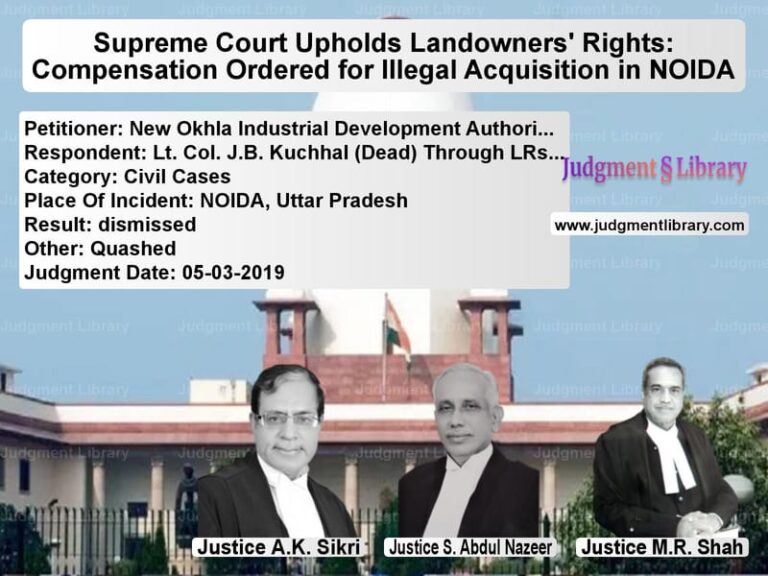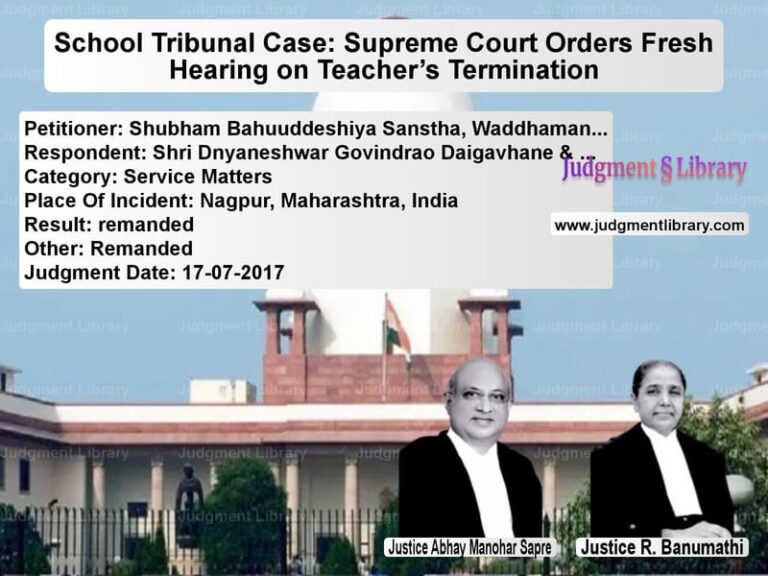Delayed Reasoned Judgments: Supreme Court Directs Timely Delivery in Consumer Cases
The case of Sudipta Chakrobarty & Anr. v. Ranaghat S.D. Hospital & Ors. highlights a crucial issue in the Indian judicial system—delayed reasoned judgments. The Supreme Court was tasked with addressing the widespread practice of courts and tribunals pronouncing the operative part of judgments but delaying the delivery of detailed reasoning, thereby prejudicing the rights of litigants.
The appeal stemmed from a decision by the National Consumer Disputes Redressal Commission (NCDRC), where an operative order was issued but the reasoned judgment was delayed for an extended period. This practice led to uncertainty for both the aggrieved and succeeding parties, denying them the opportunity to effectively challenge or enforce the decision. The Supreme Court, in its ruling, emphasized that such delays violate Article 21 of the Constitution and issued directions to ensure that reasoned judgments are delivered promptly.
Background of the Case
The case arose when the appellants, Sudipta Chakrobarty and another party, challenged a decision of the NCDRC, arguing that the tribunal had failed to provide a timely reasoned judgment. The NCDRC had pronounced the operative part of the order on April 26, 2019, but the detailed reasons were disclosed only after eight months.
As per a report submitted by the Registrar of the NCDRC on July 27, 2020, there were 85 cases where the operative order had been pronounced, but reasoned judgments had not been delivered. The Supreme Court took cognizance of this issue and expressed its strong disapproval of such a practice.
Arguments by the Petitioner (Sudipta Chakrobarty & Anr.)
The petitioners contended the following:
- The delay in delivering the reasoned judgment violated their right to a fair trial under Article 21 of the Constitution.
- The absence of reasoning made it impossible to effectively challenge the decision before a higher court.
- Such delays unfairly impacted both the losing and winning parties, as one could not challenge the decision, while the other could not enforce it.
- The issue was not limited to a single case but was a systemic failure affecting numerous pending cases.
Arguments by the Respondent (Ranaghat S.D. Hospital & Ors.)
The respondents argued:
- There was no explicit legal requirement for reasoned judgments to be delivered immediately after pronouncing the operative order.
- The commission faced administrative challenges and backlog, which contributed to the delay.
- The Supreme Court should consider the practical difficulties of tribunals handling a large volume of cases.
Supreme Court’s Analysis
The Supreme Court examined whether delayed reasoned judgments violate the fundamental rights of litigants and whether such delays should be addressed through judicial intervention. The Court analyzed several precedents on the importance of timely judgments.
1. Importance of Reasoned Judgments
The Court reaffirmed that reasoned judgments are crucial for upholding the principles of natural justice. Citing previous cases, it noted:
“The rights of the aggrieved parties are being prejudiced if the reasons are not available to them to avail of the legal remedy of approaching the Court where the reasons can be scrutinized.”
The Court stressed that failing to provide reasoning defeats the right to appeal and also prevents the winning party from executing the judgment effectively.
2. Violations of Article 21
The Court ruled that the practice of delaying reasoned judgments was a violation of Article 21 (Right to Life and Personal Liberty) of the Constitution. It cited the case of State of Punjab v. Jagdev Singh Talwandi (1984), where a Constitution Bench had emphasized the necessity of providing reasons along with the judgment.
3. Judicial Precedents
The Court referred to multiple cases where similar delays had been criticized, including:
- Anil Rai v. State of Bihar (2001) – Held that delayed judgments create injustice.
- Zahira Habibulla Sheikh v. State of Gujarat (2004) – Stressed the importance of timely and reasoned orders.
- Ajay Singh v. State of Chhattisgarh (2017) – Ruled that judgments delayed without justifiable cause violate constitutional rights.
Final Judgment
The Supreme Court issued strong directions to curb the practice of delayed reasoned judgments:
- The President of the National Consumer Disputes Redressal Commission (NCDRC) must ensure that reasoned judgments are delivered promptly.
- Going forward, reasoned judgments must be delivered within two months of pronouncing the operative part of the order.
- The judgment must be communicated to all tribunals and lower courts to ensure compliance.
- The Court directed the Registrar of the NCDRC to submit a report confirming compliance with these directives.
Legal Significance
This judgment sets an essential precedent regarding judicial accountability:
- Ensuring Transparency: Courts and tribunals must deliver reasoned judgments within a fixed timeline to uphold fairness.
- Right to Appeal: Litigants should not be deprived of their right to challenge decisions due to delayed reasoning.
- Judicial Accountability: The ruling mandates strict oversight on procedural delays in consumer courts and other tribunals.
- Standardizing Legal Procedures: The two-month deadline ensures that judgments are not indefinitely delayed.
The Supreme Court’s ruling reinforces that justice delayed is justice denied and ensures that all courts adhere to fundamental principles of fairness and accountability.
Petitioner Name: Sudipta Chakrobarty & Anr..Respondent Name: Ranaghat S.D. Hospital & Ors..Judgment By: Justice Indu Malhotra, Justice Ajay Rastogi.Place Of Incident: West Bengal.Judgment Date: 15-02-2021.
Don’t miss out on the full details! Download the complete judgment in PDF format below and gain valuable insights instantly!
Download Judgment: sudipta-chakrobarty-vs-ranaghat-s.d.-hospit-supreme-court-of-india-judgment-dated-15-02-2021.pdf
Directly Download Judgment: Directly download this Judgment
See all petitions in Consumer Rights
See all petitions in Legal Malpractice
See all petitions in Judgment by Indu Malhotra
See all petitions in Judgment by Ajay Rastogi
See all petitions in dismissed
See all petitions in supreme court of India judgments February 2021
See all petitions in 2021 judgments
See all posts in Civil Cases Category
See all allowed petitions in Civil Cases Category
See all Dismissed petitions in Civil Cases Category
See all partially allowed petitions in Civil Cases Category







